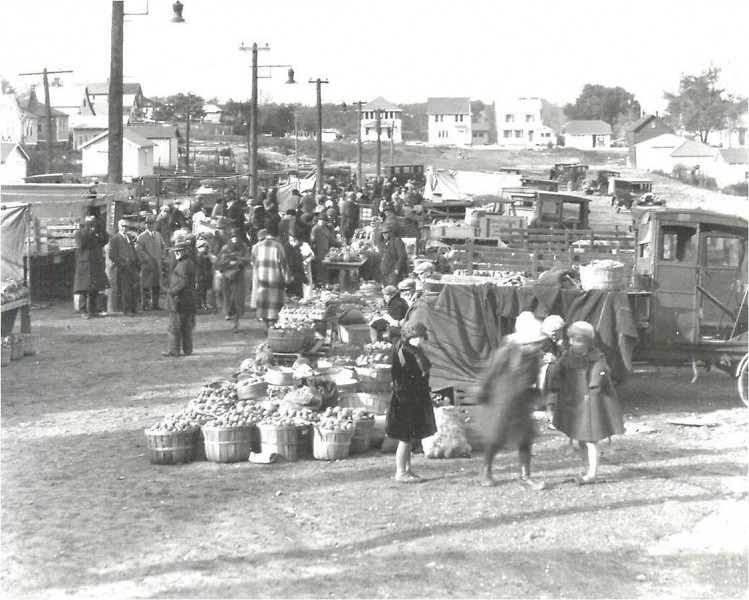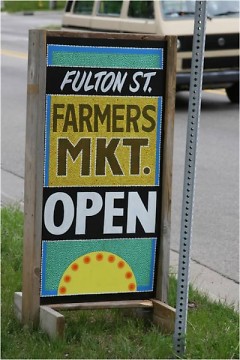Oh, the deliciousness that comes when the Fulton Street Farmers Market – West Michigan’s oldest greenmarket - opens at 8 a.m. on the first Saturday in May, in its cozy neighborhood corner at East Fulton Street and Fuller Avenue NE.
On May 4, the farmers market opens for its 91st season. New this year is the market’s year-round building, opening for the first time that day.
The new LEED-registered building (currently awaiting its final certification) funded by the successful and ongoing $3 million capital campaign, will house the market office and handicapped accessible restroom, with most of the building serving as space for five permanent producers, some of West Michigan’s favorites.
Look for Wayland’s Ginny and Pat Rakowski of Rakowski Family Farm providing meat, eggs, vegetables and maple syrup as well as Mooville milk products; The Local Epicurean, wild food for urban people; Ravenna’s Fantabulous Fudge Company; Caledonia’s Real Food Farm, offering safe and honest produce; and August’s Kitchen, artisan bakery in Grand Rapids.
Nearby, on the market’s north side, food trucks and vendors – Silver Spork, Pita Pitstop and Three Good Dogs, will keep the party going, by offering hot foods.
For the 91st season, from the fields and hand-crafted in small-batch perfection, the stalls will be cozy and crowded with rhubarb- springtime's fruit that is really a vegetable- as well as spring greens, hydroponically-grown micro-greens, foraged mushrooms, this season’s maple syrup, raw-milk cheeses, farm-fresh eggs of every color and breed, including chicken, duck, goose, guinea fowl, pastured meat, and the workhorse plants that flourish in kitchen gardens. Also, look for springtime bedding plants, hanging baskets and flowers perfect for Mother’s Day.
May 4 marks the day that the market resumes regular weekly hours. Regular hours are 8 a.m.-3 p.m. Tuesday, Wednesday, Friday, and Saturday, with Wednesday evening market hours from 4-7:30 p.m. June through September. The market has been open throughout the winter from 10 a.m-1 p.m. every Saturday from January through April.
The newest addition at Fulton Street Farmers Market is exploring ways to give customers more, like educational perks, chef demonstrations, al fresco feasts on local food, small-batch preserving and even an on-site ATM.
“I think of the Fulton Street Farmers Market as the people's market because we draw from every segment of society,” says Melissa Harrington, market manager at Fulton Street Farmers Market. “On any given day, we might have immigrants from Bethany Christian Services’ refugee resettlement-acculturation program, retirement homes ferrying over their residents, some grandparents, who have been coming practically since the market opened with their grandchildren and even great-grandchildren, neighbors from Midtown, Eastown and Heritage Hill with strollers and red wagons, others who take the bus, and many, many customers who drive in from the suburbs.”
“All of that has solidified our character," she says. "It’s really who we are: the people’s market.”
“That sense of ownership is so awesome,” says Harrington.
That sense of ownership also brings participation, says Christine Helms-Maletic, Fulton Street Farmers Market’s Project Development Manager. Helms-Maletic spearheaded the $3 million capital campaign for the farmers market - a city-owned property, culminating to a unique partnership between the city and Midtown Neighborhood Association.
“The completion of construction this spring really puts a bow on the whole project and accomplishes some of our initial goals -- enhancing accessibility by adding wheelchair-accommodating restrooms at both ends of the market and expanding the community's access to Good Food by increasing our hours of operation year-round,” Helms-Maletic says.
“It was so gratifying to see the entire - and I mean entire - community come together to support this project, from foundations and philanthropists to customers to vendors to local businesses to city, state and local government,” Helms-Maletic continues. “However, special credit goes to the Midtown Neighborhood Association, which took a leap of faith back in 2006 when this project was conceived and has been taking one every day for the seven years it took to get to this point. What a great demonstration of the power of grassroots."
And the giving just keeps on. During peak season, each week the market welcomes about 10,000 customers, and each one of them spends about $20 at another local business on the same trip. So, the market folks figure Fulton Street market generates around $200,000 per week, or just over $10 million per year potentially, for local businesses in Grand Rapids. It’s worth noting, about 33 percent of market customers come from more than five miles away, bringing suburban dollars into the city for shopping at the market and other local businesses.
With an eye toward inclusion and equality, the market continues a pilot program to help mothers participating in Women Infants and Children (WIC) Program, a federally funded nutrition program for mothers with low incomes, to use her electronic benefits transfer (EBT) cards to purchase whole foods at the farmers market. To that end, each farmer will be equipped with an iPod touch device allowing customers to swipe an EBT card, much like a grocery store’s checkout counters. The hope is to eventually replace the market’s wooden tokens for the iPod touch, which has a snap-on magnetic card reader attached. “We’re the only county in the nation doing the WIC/EBT electronic pilot program,” Harrington says. “There are a lot of people in the country watching what we’re doing.”
In July, the farmers market will resume its Double Up Food Bucks Program, letting residents in nutrition assistance programs buy twice as much Michigan-grown fruits and vegetables as before. In this way, food dollars spent at the farmers market are “doubled” up to $20 per day, so the customer can go home with $40 worth of Michigan good-for-you produce.
Come May 4, under the market shed’s towering blue roof, look for a full-house with more than 60 of the market’s best-loved personalities. Don’t miss the growers, with the longest tenures, such as Tanis Orchards, Vissers Farms, Strick Produce and Rainbow Greenhouses.
Constantly on the lookout for new and unique, the market’s sense of community welcomes back those vendors that have identified a tasty niche, such as the garlic ladies, Val Burke and Kim Sanwald, the mozzarella lady, Kathy Gibbons of Buzzelli Foods and Dorothy and Tony’s Gourmet Kettle Corn. Shoppers show up promptly to snap up truly free-range, pastured eggs and heritage pork from grass-fed and pastured-raised animals of market mainstays Jill Johnson and Mary Wills of Crane Dance Farm as well as the kinds of heirloom vegetables featured in Slow Food’s Ark of Taste.
“Our growers are taking advantage of the newest and coolest farming techniques, like cold frame and hoop houses, to start their growing season earlier,” Harrington says.
“If it’s grown in Michigan,” she says, “It’s here.”
The Rapidian, a program of the 501(c)3 nonprofit Community Media Center, relies on the community’s support to help cover the cost of training reporters and publishing content.
We need your help.
If each of our readers and content creators who values this community platform help support its creation and maintenance, The Rapidian can continue to educate and facilitate a conversation around issues for years to come.
Please support The Rapidian and make a contribution today.



